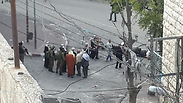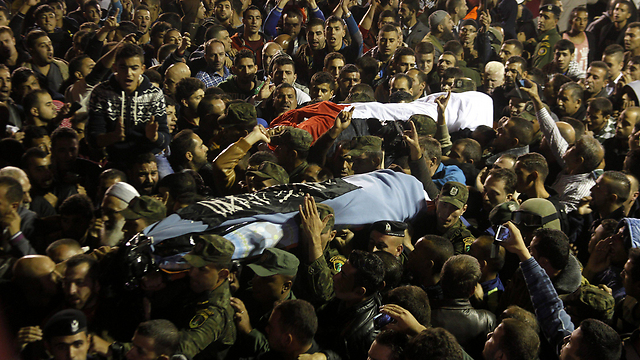
On the Palestinian street, there are signs of a sense of victory in the current wave of terror
Returning terrorists' bodies only intensifies terror
Op-ed: The political echelon's decision to return bodies would be logical in the event of a diplomatic agreement, as a goodwill gesture, but in the midst of a terror offensive it is perceived by the Palestinians as a sign of weakness.
Around a plot in a field not far from Damia Bridge in the Jordan Valley, there is a fence with a sign reading, "Off Limits - No Entry." It is a cemetery for the enemy's fallen, which is known by the residents of the territories as "Maqburat al-Arqam" (the cemetery of numbers).

Since 1967, hundreds of terrorists have been buried there, with a number imprinted on each grave. The Defense Ministry holds the code for converting the numbers into names and details.
Since 1967, Israel has been implementing a policy of holding on to the bodies of terrorists who committed murderous acts, believing that one day it might have to use them as bargaining chips for the release of prisoners of war or soldiers' bodies. Other reasons were the desire to show the Palestinians that terror carries a price and to prevent the creation of heroes and role models.
The demand to return bodies has been raised in every round of talks between Israel and the Palestinians since 1994. A public committee dedicated to the bodies' return ("The National Campaign") has been established, associations advancing the bodies' return are active in East Jerusalem and in the territories, and some of their lawyers who petitioned the High Court of Justice received rulings which forced the defense establishment to return about 50 bodies. Another 90 bodies were returned as a gesture to the Palestinian Authority, and several dozen were returned as part of body swaps with Hezbollah.

Bodies of terrorists returned last week. It's a short way from the funeral to the knife (Photo: EPA) (צילום: EPA)
The Palestinian society and leadership's unequivocal demand to return terrorists' bodies is an expression of support for their activity and they are seen as patriots who deserve to be included in the national pantheon. For this reason, the demand is made regardless of their organizational affiliation, whether they are Islamic Jihad terrorists, Hamas suicide bombers, Popular Front murderers or Fatah members. They are all "shahidim" (martyrs).
And so the bodies' return becomes a national event: The body is confiscated from the family and moved into the public domain. It is greeted in an official military ceremony by honor guards and senior PA representatives, the coffins are covered with the Palestinian flag and carried by men in uniform, and a gun salute accompanies the funeral.
It's a collective ceremony which turns into a show of national solidarity, along with expressions of anger, hatred and feelings of revenge. It's a short way from the funeral to the knife.
In 2012, for example, Israel returned the body of Izz al-Din al-Masri, the Hamas terrorists who carried out the deadly attack at the Sbarro restaurant in Jerusalem, and his grave became a pilgrimage site for young Palestinians. The funeral of Ahmed Abdel Jawad, the Hamas terrorist who murdered the Gavish family members in Elon Moreh in 2002, was a national show of hatred towards Israel. Thousands participated in the funeral of Ayat al-Akhras, a Fatah activist who detonated explosives belted to her body at the entrance to a Jerusalem supermarket in 2002, and she became an exemplary figure and a myth of heroism.
So it's hard to understand why the defense establishment are saying that there is no use in holding on to the bodies. After holding the bodies for some 50 years and using them as bargaining chip, they are claiming with moral arrogance that "we don't trade with bodies. That is not our way."
In addition, politicians are claiming, contrary to the Shin Bet chief's opinion, that "holding on to the bodies does not serve the Israeli interest and causes significant damage to the discourse for mutual calm between the sides." In other words, if we return bodies, the wave of violence will end. As if the violent Palestinian battle these days is for the return of bodies rather than against the occupation.
A decision to return bodies would be logical in the event of a diplomatic agreement, as a goodwill gesture, but not in the midst of a terror offensive. The political echelon's decision points to weakness and a desire to buy short-term calm.
The Palestinians see the weakness in this move. On the Palestinian street, there are signs of a sense of victory in the current wave of terror. They are drawing encouragement from the fear among the Israeli public, from the results of the battle over the Temple Mount, and - in the past few days - from the return of terrorists' bodies. All this does not point to a calm but rather serves as a source of encouragement to intensify the wave of terror.
Dr. Ronni Shaked, Yedioth Ahronoth's former correspondent and commentator on Palestinian affairs, is a research fellow at the Harry S. Truman Research Institute for the Advancement of Peace at Hebrew University.










